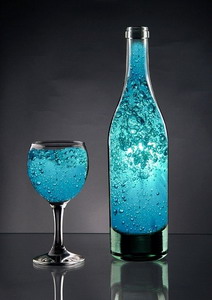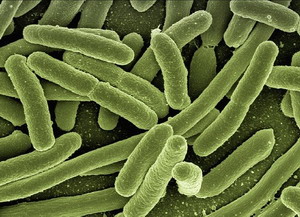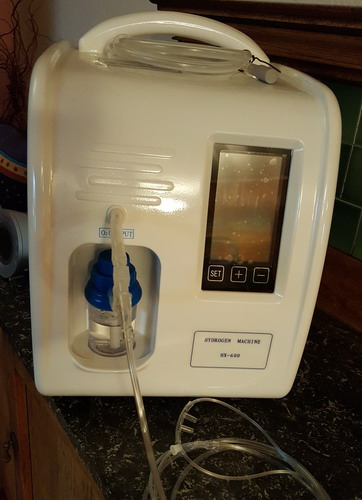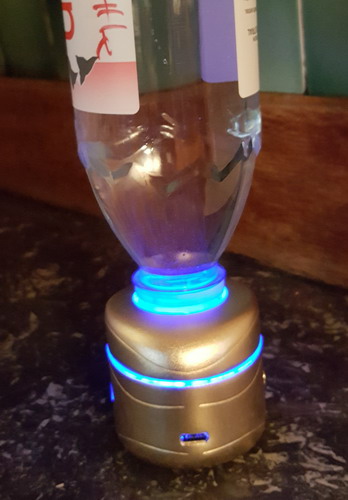We have been hearing about the coming hydrogen economy with cars and planes using hydrogen for fuel for many years. Some designs burn hydrogen  directly, like the space shuttle, while others use the hydrogen to power a fuel cell and make electricity to run electric motors. Hydrogen is powerful stuff, but did
you know that it is also a vital nutrient for the human body? All kinds of stuff in the body depends on the movement of hydrogen to make things happen. For instance, hydrogen is the most basic anti-oxidant in the body that is used to neutralize the toxic hydroxyl radicals (*OH) that destroy our cell membranes. It is popular these days to take herbs and various fruit concentrates because of their antioxidant benefits. Hydrogen does a better job on many
levels.
directly, like the space shuttle, while others use the hydrogen to power a fuel cell and make electricity to run electric motors. Hydrogen is powerful stuff, but did
you know that it is also a vital nutrient for the human body? All kinds of stuff in the body depends on the movement of hydrogen to make things happen. For instance, hydrogen is the most basic anti-oxidant in the body that is used to neutralize the toxic hydroxyl radicals (*OH) that destroy our cell membranes. It is popular these days to take herbs and various fruit concentrates because of their antioxidant benefits. Hydrogen does a better job on many
levels.
So how come we have never heard of molecular hydrogen on the list of necessary nutrients for our life? Part of the problem is that hydrogen is the smallest molecule in existence. You can't even put it  in a glass bottle without it leaking outright through the walls of the bottle in a few days.
That makes it very difficult to market, and although we like to believe that science is above such crass realities as marketing, scientists have rent to pay and the need to feed their kids like everyone else. If there is no way to make money from a line of research, no one will pay you to research it. No one was looking at the benefits or necessity of hydrogen until about 2007. Even then, most of the research has been done in Japan, where therapeutic benefits were found mixing
hydrogen with saline water and infusing it into the body in a clinic. Now there are about 1600 researchers worldwide studying the health benefits of hydrogen and almost a thousand papers have been written.
in a glass bottle without it leaking outright through the walls of the bottle in a few days.
That makes it very difficult to market, and although we like to believe that science is above such crass realities as marketing, scientists have rent to pay and the need to feed their kids like everyone else. If there is no way to make money from a line of research, no one will pay you to research it. No one was looking at the benefits or necessity of hydrogen until about 2007. Even then, most of the research has been done in Japan, where therapeutic benefits were found mixing
hydrogen with saline water and infusing it into the body in a clinic. Now there are about 1600 researchers worldwide studying the health benefits of hydrogen and almost a thousand papers have been written.
If it is so important for health, where have we been getting it up till now? Is it in the foods we eat? The answer is sort of yes and also no. Hydrogen is produced by various strains of gut bacteria as they  break down fibers. Usually, this hydrogen is absorbed through the gut wall and picked up
by our blood stream. But when certain fibers (like in legumes) contain sulfur as well, the hydrogen may form hydrogen sulfide, which becomes the really smelly type of bowel gas. Hydrogen is one of the reasons it is so important to eat soluble fibers that feed our gut bacteria. Throughout history, we have generally consumed a lot of fiber, because the food was simply not highly refined until about a hundred years ago. When food is refined, it is the fiber that they are
primarily taking out. So part of our current bad health epidemic may be due to ever-lower levels of hydrogen in our systems from lack of the right food that feeds the right bacteria.
break down fibers. Usually, this hydrogen is absorbed through the gut wall and picked up
by our blood stream. But when certain fibers (like in legumes) contain sulfur as well, the hydrogen may form hydrogen sulfide, which becomes the really smelly type of bowel gas. Hydrogen is one of the reasons it is so important to eat soluble fibers that feed our gut bacteria. Throughout history, we have generally consumed a lot of fiber, because the food was simply not highly refined until about a hundred years ago. When food is refined, it is the fiber that they are
primarily taking out. So part of our current bad health epidemic may be due to ever-lower levels of hydrogen in our systems from lack of the right food that feeds the right bacteria.
Hydrogen has been found to have therapeutic potential in over 170 human and animal disease models. The research that kicked the recent huge interest in hydrogen was an experiment showing that  hydrogen significantly reduced the damage caused by temporarily stopping the blood flow to rats' brains, even better
than the approved drug for that purpose – Edaravone, without any of the drug side effects. That was in 2007. Now hydrogen is a hot topic for research. I mentioned earlier that nothing happens without research money. Well in this case that money can flow from new treatments for diseases. Additionally new technology (PE membranes) has been developed that makes the production of molecular hydrogen much easier and more efficient.
hydrogen significantly reduced the damage caused by temporarily stopping the blood flow to rats' brains, even better
than the approved drug for that purpose – Edaravone, without any of the drug side effects. That was in 2007. Now hydrogen is a hot topic for research. I mentioned earlier that nothing happens without research money. Well in this case that money can flow from new treatments for diseases. Additionally new technology (PE membranes) has been developed that makes the production of molecular hydrogen much easier and more efficient.
So what can molecular hydrogen do for you?
Hydrogen acts to reduce inflammation just the right amount by lowering cytokines, inflammatory messengers, and control systems. It increases detoxification by turning on the Nrf2 pathways and increasing glutathione; the master detoxifier. These pathways also switch on 200 different genes for protecting the cells. It neutralizes oxidative stress  from free radicals in the body. It improves both cholesterol and glucose tolerance. Hydrogen stimulates autophagy: the process whereby the body destroys old damaged cells and replaces them with new ones. It is being used to treat post-cardiac syndrome and cerebral infarcts (strokes). Drinking hydrogen water has been found to help Parkinson's patients. Particularly relevant now is its ability to turn down the
effects of chronic stress on the central brain pathways to lower the sympathetic nerve overload. This reduces anxiety and nervousness and generally improves mood. An interesting effect of hydrogen is that it reproduces the effects that exercise has on the body. It even helps promote the recovery from real exercise. Hydrogen is also widely used in Japan for reducing wrinkles and improving the skin, as it greatly increases the growth of collagen in the skin. The list
goes on and on. Hydrogen is so small that it can pass through every membrane in every cell to get literally everywhere in the body. You can even put a plastic bag over an arm or leg and fill the bag with hydrogen and it will pass through the skin and into the body.
from free radicals in the body. It improves both cholesterol and glucose tolerance. Hydrogen stimulates autophagy: the process whereby the body destroys old damaged cells and replaces them with new ones. It is being used to treat post-cardiac syndrome and cerebral infarcts (strokes). Drinking hydrogen water has been found to help Parkinson's patients. Particularly relevant now is its ability to turn down the
effects of chronic stress on the central brain pathways to lower the sympathetic nerve overload. This reduces anxiety and nervousness and generally improves mood. An interesting effect of hydrogen is that it reproduces the effects that exercise has on the body. It even helps promote the recovery from real exercise. Hydrogen is also widely used in Japan for reducing wrinkles and improving the skin, as it greatly increases the growth of collagen in the skin. The list
goes on and on. Hydrogen is so small that it can pass through every membrane in every cell to get literally everywhere in the body. You can even put a plastic bag over an arm or leg and fill the bag with hydrogen and it will pass through the skin and into the body.
As normal health consumers we probably are not going to be using saline hydrogen injections or hyperbaric hydrogen treatments, so how can we access this powerful nutrient for ourselves? With the advances in technology I mentioned earlier, hydrogen gas generators have become available to us the  common
people. I bought a big one about a year ago for $2500 that produces 600ml of hydrogen gas per minute. This is designed to be hooked up to a plastic tube with a nasal cannula just like folks on oxygen use. Alternatively, the hydrogen can also be run through a silver stone bubbler to diffuse the hydrogen into the water for drinking or applying to the skin. We can even wrap a plastic bag around an injury on an arm or leg for direct hydrogen gas treatment to the injury.
I have been thinking of bringing my big unit to the office as an inexpensive additional therapy patient could use before or after treatment. With the high level of hydrogen production of this unit, a saturation of the body can be achieved in about 15 minutes when breathing. Let me know if you are interested in having this available for you – david@fairoakshealth.com.
common
people. I bought a big one about a year ago for $2500 that produces 600ml of hydrogen gas per minute. This is designed to be hooked up to a plastic tube with a nasal cannula just like folks on oxygen use. Alternatively, the hydrogen can also be run through a silver stone bubbler to diffuse the hydrogen into the water for drinking or applying to the skin. We can even wrap a plastic bag around an injury on an arm or leg for direct hydrogen gas treatment to the injury.
I have been thinking of bringing my big unit to the office as an inexpensive additional therapy patient could use before or after treatment. With the high level of hydrogen production of this unit, a saturation of the body can be achieved in about 15 minutes when breathing. Let me know if you are interested in having this available for you – david@fairoakshealth.com.
Another alternative that is available to consumers is small portable hydrogen production units that are the size of water bottles. Most are designed to diffuse water with hydrogen. Unfortunately, when you do the research you find that to have any kind of clinical effect the hydrogen concentration has to be at least 10 times higher than most of these produce. You need 2-5 ppm of hydrogen in water to get the
benefits. I have found a couple of units that can  produce this concentration on the internet, but these units cost around $300 -$450. Knowing that all these products are made in China, I went directly to the makers of these products and found that I could buy a hydrogen making unit that not only had the best concentration but also could be hooked up to a nasal cannula for
breathing the hydrogen for only $179 plus shipping. They take a couple of weeks for shipping (I got one for Ellen), but they offer a real solution for all of us stuck at home most of the time. Again, let me know if you are interested. If I do a group order the shipping per item is much less.
produce this concentration on the internet, but these units cost around $300 -$450. Knowing that all these products are made in China, I went directly to the makers of these products and found that I could buy a hydrogen making unit that not only had the best concentration but also could be hooked up to a nasal cannula for
breathing the hydrogen for only $179 plus shipping. They take a couple of weeks for shipping (I got one for Ellen), but they offer a real solution for all of us stuck at home most of the time. Again, let me know if you are interested. If I do a group order the shipping per item is much less.
This is cutting edge science here that is still in the research stage for discovering all that it can do. Fortunately, there is a long history of using hydrogen for underwater breathing devices for deep dives  where just air alone does not work, so the safety of breathing hydrogen is well established. None
of the studies to date have shown any downsides to hydrogen used therapeutically, which is really amazing since it has so many profound effects on the body. Any drugs that have even a fraction of the benefits of hydrogen have a long list of side effects. Most likely the safety of hydrogen is because we have been taking in hydrogen for millions of years from our gut bacteria, so our bodies have had lots of time to develop pathways of using it.
where just air alone does not work, so the safety of breathing hydrogen is well established. None
of the studies to date have shown any downsides to hydrogen used therapeutically, which is really amazing since it has so many profound effects on the body. Any drugs that have even a fraction of the benefits of hydrogen have a long list of side effects. Most likely the safety of hydrogen is because we have been taking in hydrogen for millions of years from our gut bacteria, so our bodies have had lots of time to develop pathways of using it.
Personally, I try to get in at least one breathing session with hydrogen every day. I am just now playing with the diffusion of hydrogen in water, as I  suspect that taking in hydrogen by this route will have some different effects. I believe that molecular hydrogen will become a “big thing” in
a few years in the health field. Right now it is still very new and very much a hot research topic. At this point though its benefit is solidly established. They are still trying to figure out how it can have a positive benefit on so many things, but I am fine with that.
suspect that taking in hydrogen by this route will have some different effects. I believe that molecular hydrogen will become a “big thing” in
a few years in the health field. Right now it is still very new and very much a hot research topic. At this point though its benefit is solidly established. They are still trying to figure out how it can have a positive benefit on so many things, but I am fine with that.
Take care,
David
We have received a third batch of  copies of my book The Balanced Life. They are available in the office for $17.99, and they are also
available on Amazon.com
copies of my book The Balanced Life. They are available in the office for $17.99, and they are also
available on Amazon.com
Ellen update:
We are on to planning for Christmas dinner. Ellen got the bug that she wanted shrimp salad on butter leaf lettuce. Naturally we needed to try out such a dish to see if it would meet up to her specifications. The presentation was lovely and met with approval. The two toned jicama
accents were especially nice. But the freshly made Thousand Island dressing made with avocado mayonnaise just did not cut it. Avocado mayo is heavier. It does not have the light brightness that the toxic commercial mayonnaise has. Bummer.
see if it would meet up to her specifications. The presentation was lovely and met with approval. The two toned jicama
accents were especially nice. But the freshly made Thousand Island dressing made with avocado mayonnaise just did not cut it. Avocado mayo is heavier. It does not have the light brightness that the toxic commercial mayonnaise has. Bummer.

